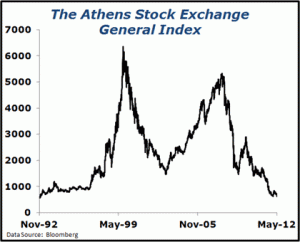Earlier today, the Euro hit its weakest level since July 2010 to the Dollar. This followed a clash between European leaders over joint bond sales at a summit.
The Euro also declined for a third day against the Yen. This as a Euro area report is due, that economists predict will show that services and manufacturing industries have shrunk for a fourth month.
The Dollar and Yen have both climbed as against most of their major counterparts. Speculation still persists that Europe’s debt crisis is deepening and this has boosted demand from investors for safer assets.
The Euro stood at $1.2580 earlier from $1.2582 yesterday, when it touched its lowest level since the 13th of July 2010 at $1.2545. It dropped 0.3% to 99.71 Yen, while the Dollar stood at 79.48 Yen.
Bank of Japan (BOJ) Governor, Masaaki Shirakawa, today stressed the central bank’s resolve to maintain its ultra-loose monetary policy. He ruled out though, any easing solely for the purpose of weakening the Yen.
He went on to say that there was no clear historical evidence, that an expansion in Japan’s monetary base does lead to a weaker Yen. This countered views that the central bank can directly push down the Yen by injecting more money into the economy.
He considered, that the biggest factor affecting currency moves at the moment, is investors’ risk aversion and went on to stress, that monetary policy alone cannot influence Yen moves.
In February, the BOJ had eased monetary policy and set an 1% inflation target. It did so in order to show its determination to beat the deflation that has plagued Japan for over a decade.
The BOJ had followed up with even more monetary easing during April. Since then, it has remained under political pressure for further action to support the economy and counter the hardship resulting from a stubbornly strong Yen.
The BOJ has pledged to pursue powerful monetary easing until such time that an 1% inflation figure is in sight, and will likely continue with its efforts to beat deflation with its key monetary easing tool; its asset-buying program.
On the longer term time line surely the euro will have some export easing benefit from the Euro drop, even so as it continues fall down hill.
On shorter term we still have this contagious crisis…keeps popping out as popcorn on a micro..
I can promise one thing, it is going to be a very HOT summer, did you remember last years summer ?
Yes, same thing just bigger….
All the best!
Erik
